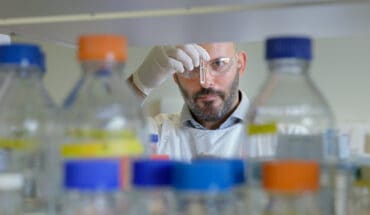Young, tall and white? You’re at increased risk of testicular cancer, says expert, as cases rise 25%: London Medical Laboratory’s latest research reveals that if you are young, tall and white, your chances of developing testicular cancer are noticeably higher.
After analysing years of research into the causes of testicular cancer, London Medical Laboratory has revealed that younger, white men of above-average height are at highest risk of the disease.
The leading testing expert, Dr Quinton Fivelman PhD, Chief Scientific Officer at London Medical Laboratory, says: ‘Our analysis of 12 years of research has revealed some significant, if currently unexplained, factors that increase a man’s chances of being at risk.
‘The first risk factor is age. Testicular cancer is frequently the most common malignancy among young adult men. The disease is most common among under-35-year olds, with the highest incidence rates being in the 30 to 34 age group. Only 1% of 75 year olds and over develop the disease.
‘The second risk factor is height. An influential paper published in the British Journal of Cancer in 2010 determined that for every extra 5cm (2 inches) in height above average, the risk of testicular cancer went up by 13%.
‘The paper looked at the results of 13 studies and concluded that, although it is unlikely that height is a direct cause, it is probable that some underlying factor influences both body size and risk of testicular cancer. Of the 13 trials, all but three reported an association between height and testicular cancer risk.
‘Currently, no concrete cause for the link between height and testicular cancer cases has been identified, but some scientists are looking at whether it is associated with a high fat or dairy intake in childhood. Interestingly, however, there’s no research finding any link between body weight and developing testicular cancer.
‘The third risk factor is race. Being white also increases the risk of developing the disease. Our research indicates that, worldwide, the risk of testicular cancer among white men is about four to five times higher than that of black and Asian men. Cancer Research UK says: “In the UK, white men have a higher risk of testicular cancer than men from other ethnic groups”.
‘That’s backed up by research from the USA. According to John Hopkins Medicine, testicular cancer is most common in white (Caucasian) men in the United States and less common in black (African-American), Hispanic and Latino and Asian-American men. Worldwide, the risk of developing this disease is highest among men living in the United States and Europe, and lowest among men living in Africa or Asia.
‘One more factor that could be significant in determining if a man might develop testicular cancer is having undescended testicles (a condition known as cryptorchidism). For these people, the risk is greater if the condition has never been corrected or if their surgery took place after the age of 13.
‘Currently, there are around 2,400 new testicular cancer cases in the UK every year. That’s more than six every day. The number of cases of testicular cancer diagnosed each year in Britain has roughly doubled since the mid-1970s, and research in the European Journal of Cancer forecasts an increase of 25% across Europe between 2015 and 2025. This prediction is supported by London Medical Laboratory’s own results.
‘However, it’s important to keep in mind that, even though cases are on the rise, testicular cancer is still not a common cancer, particularly among older men. Around 1 in 215 UK males will be diagnosed with the cancer in their lifetime. And the good news is that around 98% of men diagnosed with the disease survive for at least 10 years. Even after the cancer has spread, patients can still be successfully treated.
‘It’s obviously important that everyone, but particularly those men who are most at risk, are aware of any changes to the size and weight of their testicles and don’t delay seeing their GP if they are concerned.
‘Men’s bodies are a well-designed machine but, as with any equipment that our life depends on, it’s best to keep it tested and well-maintained. Blood tests are one useful way men can obtain an essential MOT, checking for specific male issues from prostate problems to erectile dysfunction. Blood tests will reassure most men they are healthy and, in cases where issues are found, improve outcomes by identifying them earlier.
‘For example, London Medical Laboratory’s own at-home finger-prick Male Hormones Profile test checks the full range of men’s hormones and is very useful for giving information about fertility, planning sports and fitness programmes and monitoring testosterone supplementation. For full details see https://www.londonmedicallaboratory.com/product/male-hormone-profile
- Combination of drugs could prevent thousands of heart attacks - 21st April 2025
- UQ Study Links Poor Teen Diets to Heavy Social Media Use - 21st April 2025
- Gut microbiome could delay onset of type 1 diabetes - 3rd April 2025






